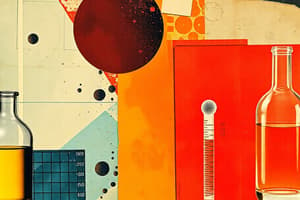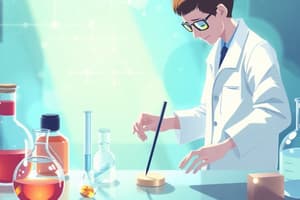Podcast
Questions and Answers
What is the first step in the scientific method?
What is the first step in the scientific method?
- Make a prediction
- Ask a question (correct)
- Research
- Experiment
What role does a hypothesis play in an experiment?
What role does a hypothesis play in an experiment?
- It summarizes the data collected during the experiment.
- It is a statement predicting the outcome based on previous observations. (correct)
- It keeps all variables in the experiment constant.
- It is a measurement used to collect data.
Which of the following best describes independent variables in an experiment?
Which of the following best describes independent variables in an experiment?
- Variables that are kept constant to ensure a fair test.
- Variables that are purposely changed to observe their effect. (correct)
- Variables that change during the course of the experiment.
- Variables that are affected by other changes in the experiment.
Which statement correctly defines controlled variables?
Which statement correctly defines controlled variables?
What should be done if the results of an experiment do not support the hypothesis?
What should be done if the results of an experiment do not support the hypothesis?
When interpreting experimental data, what should be checked first?
When interpreting experimental data, what should be checked first?
In the context of the scientific method, why is it important to spread the word about results?
In the context of the scientific method, why is it important to spread the word about results?
What is the purpose of gathering evidence during an experiment?
What is the purpose of gathering evidence during an experiment?
Which step directly follows making a prediction in the scientific method?
Which step directly follows making a prediction in the scientific method?
What is the dependent variable in an experiment?
What is the dependent variable in an experiment?
Which step is NOT part of the engineering design process?
Which step is NOT part of the engineering design process?
What defines an atom?
What defines an atom?
Which statement about valence electrons is TRUE?
Which statement about valence electrons is TRUE?
What best defines a molecule?
What best defines a molecule?
How do compounds differ from molecules?
How do compounds differ from molecules?
Which of the following is NOT a characteristic of pure substances?
Which of the following is NOT a characteristic of pure substances?
What is a controlled variable in an experiment?
What is a controlled variable in an experiment?
Which of the following statements about mixtures is correct?
Which of the following statements about mixtures is correct?
Which group of elements is known as 'rebellious' due to their bonding behavior?
Which group of elements is known as 'rebellious' due to their bonding behavior?
Flashcards
Scientific Method
Scientific Method
A series of steps used by scientists to conduct research and test ideas systematically.
Ask a Question
Ask a Question
A specific question that guides the scientific investigation.
Research
Research
Gathering information about the topic being investigated.
Prediction
Prediction
Signup and view all the flashcards
Experiment
Experiment
Signup and view all the flashcards
Results
Results
Signup and view all the flashcards
Hypothesis
Hypothesis
Signup and view all the flashcards
Constants
Constants
Signup and view all the flashcards
Independent Variable
Independent Variable
Signup and view all the flashcards
Dependent Variable
Dependent Variable
Signup and view all the flashcards
Controlled Variables
Controlled Variables
Signup and view all the flashcards
Control (in an experiment)
Control (in an experiment)
Signup and view all the flashcards
Timeline
Timeline
Signup and view all the flashcards
Engineering Design Process
Engineering Design Process
Signup and view all the flashcards
Atom
Atom
Signup and view all the flashcards
Nucleus
Nucleus
Signup and view all the flashcards
Electron
Electron
Signup and view all the flashcards
Valence Electrons
Valence Electrons
Signup and view all the flashcards
Molecule
Molecule
Signup and view all the flashcards
Study Notes
Scientific Method
- Scientists use a series of steps called the scientific method to ensure their work is reliable.
- Steps include: asking a question, researching, making a prediction, experimenting, collecting results, and sharing results (or repeating if the prediction was incorrect).
Designing Experiments
- Experiments follow the scientific method.
- Experiments require a clear question, a hypothesis (a statement about what's expected based on prior knowledge), constants (factors kept the same), an independent variable (the factor changed), and a dependent variable (the outcome measured).
- The conclusion states whether the hypothesis was supported by the results.
Interpreting Data
- Scientific evidence is the data gathered during an experiment.
- To interpret data, check if it answers the question and supports or refutes the hypothesis.
Types of Variables and Controls
- Experiments involve variables, which can be changed.
- Three main types of variables: independent variable (changed by the scientist), dependent variable (measured as a result), and controlled variables (kept the same).
- Controls in an experiment help assess the validity of the results.
Timelines
- Timelines display events in order.
- To understand a timeline: read the title, look for the time periods (days, months, years, decades, centuries), and note the events and their sequence.
Engineering Design Process
- Engineers use a design process to solve problems.
- Steps of the engineering design process: ask, research, imagine, select and plan, create, test and evaluate, and improve.
- These steps can be repeated multiple times until a satisfactory design is reached.
Atoms and Matter
- Atoms are the basic building blocks of matter.
- An atom has a nucleus (containing protons and neutrons) and electrons orbiting the nucleus.
- Atoms bond to form molecules, which can be solids, liquids, or gases.
Electrons and Electrical Current
- Electrons are negatively charged particles, in constant motion within atoms
- Electrons generate electrical current.
- Atoms bond through the interactions of their electrons.
- Atoms of different materials have different numbers of electrons.
Valence Electrons
- Valence electrons are the electrons in an atom's outermost shell.
- These electrons determine how atoms bond to form new substances.
- Scientists use the periodic table to determine the number of valence electrons.
- Atoms strive to have eight valence electrons.
Molecules
- A molecule is a group of two or more atoms bonded together.
- The types and number of atoms determine the size and shape of a molecule.
Elements, Compounds and Mixtures
- Elements are composed of one type of atom and cannot be broken down further.
- Compounds are made from two or more different types of elements chemically bound together.
- Molecules are groups of atoms chemically bound together that can form compounds.
- Mixtures are composed of two or more compounds and/or elements that do not form chemical bonds.
Studying That Suits You
Use AI to generate personalized quizzes and flashcards to suit your learning preferences.



